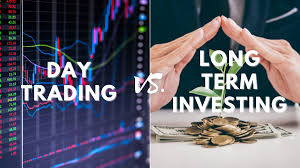11 May 2021
Trading vs Investing

What Is the Difference Between Trading and Investing?
Investing in the stock market can be done in two ways: trading and investing. Buying and selling securities for a short period of time is the focus of trading, whereas buying and holding securities for a long period of time is the focus of investing. Depending on your level of market knowledge, neither method is necessarily better or worse than the other. Learn more about both to determine which strategy is best for your specific needs and objectives.
Trading
The goal of trading is to make frequent, short-term transactions in order to "beat the market." Traders purchase and sell stocks, commodities, foreign exchange, and other liquid securities. Long-term investors might aim for a 7% annual return, while traders might aim for a 5% gain every month.
Technical analysis aids in the evaluation of stocks and the identification of trading opportunities. The evaluation is based on supply and demand and is based on past price movement and volume.
Trading Strategy
By closely monitoring price changes, traders hope to make a profit in a short period of time. Technical analysis is frequently used by active traders to research stocks and forecast trends in stock price fluctuations. Limit and stop orders are frequently used by traders to help them determine the price at which stocks will be bought or sold. Short selling is another common trading strategy that aims to make a profit by selling borrowed shares at a high price and then buying them back for a lower price later. When it comes to trading, the phrase "buy low, sell high" is frequently used.
Is Trading The Best Option?
Trading allows you to actively engage in the market on a far more regular basis than investing. Active trading necessitates a significant amount of time spent researching companies and stocks, as well as maintaining and managing a portfolio. Until you start trading, keep in mind that short-term trading carries a high risk of loss.
Investing
Investing is a long-term investment approach aimed at managing and increasing capital in the economy. Many individual investors plan for retirement by investing in the stock market through an IRA (Individual Retirement Account) or 401(k) account. You can also increase your personal wealth by investing in a personal investment account, whether through a Managed Portfolio or Self-Directed Trading (a.k.a. DIY trading).
Investing Strategy
The longer you keep your money in circulation, the more chances you'll have to profit from compound interest or returns. Year after year, compounding helps you to grow your gains. By avoiding short-term ups and downs, you can avoid emotional investing and keep your focus ahead. To maintain a degree of risk that you're comfortable with, a diversified portfolio includes investments in a variety of asset groups, sectors, and geographic areas. It's important to realize that all investment carries the possibility of loss and fluctuating returns.
Investing- The Best Option?
Investing, unlike trading, does not actually require continuous monitoring of your portfolio or the economy. Trading and long-term investments are two separate approaches to achieving the ultimate financial target. If you choose to participate in the day-to-day ups and downs of the market or prefer to ride the long-term volatility will determine which strategy you use. Although no investment can guarantee a profit, using fundamental analysis can help you make better investment decisions.
Best Institute for Stock market
In the banking, insurance, financial, and stock market sectors, NIWS is ranked first among the top five institutes. NIWS offers a variety of short-term JOB-oriented courses in Share Market, Stock Market Course In Delhi, Capital Market, Derivative (NIFTY CALL PUT), Options Strategy, Commodity Market, Forex Market and Financial Market. They have launched courses for all levels, from basic to advanced (from beginner to expert), and will continue to do so as new verticals in Accounting, Banking, and Financial Market Management courses become available. They are the first institute in the field of financial markets to offer online stock market courses (E-Learning Platform) as well as classroom instruction with an online mock test platform. Also, we are considered the stock market classes in Delhi.
